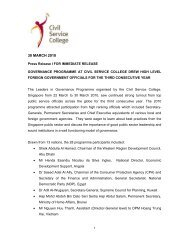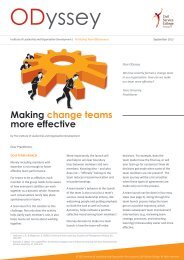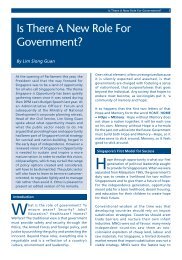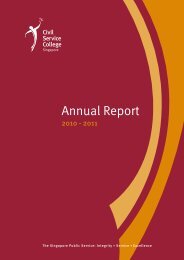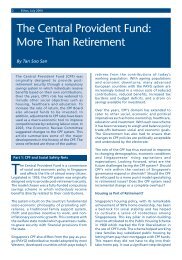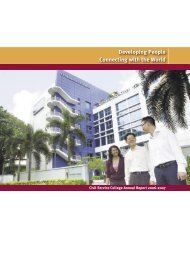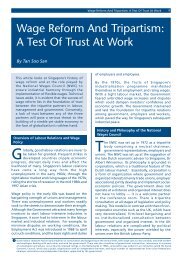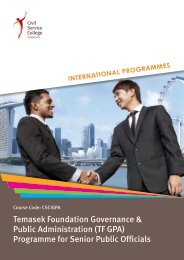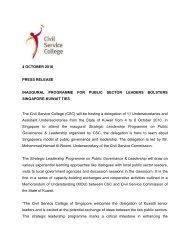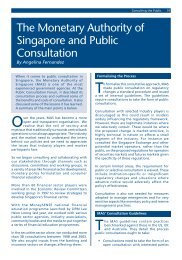The Singapore Public Service and National Development
The Singapore Public Service and National Development
The Singapore Public Service and National Development
You also want an ePaper? Increase the reach of your titles
YUMPU automatically turns print PDFs into web optimized ePapers that Google loves.
as equity. Increasing competition for talent in a globalizing world will require further<br />
improvements in human resource management in order to ensure that the public<br />
service continues to be able to attract <strong>and</strong> retain the talent <strong>and</strong> skills necessary to<br />
effectively design <strong>and</strong> implement policies in a more dem<strong>and</strong>ing environment.<br />
<strong>The</strong>re is also a need for greater diversification in the public service, <strong>and</strong> some<br />
commentators have noted the risk of overdependence on a homogenous public<br />
service elite which is unable to adapt to new <strong>and</strong> increasingly complex challenges<br />
in the future.<br />
Greater openness <strong>and</strong> a holistic approach to governance will also be essential to<br />
ensuring continued effectiveness of the public service, <strong>and</strong> equally important must<br />
be to temper any sense of elitism or arrogance which may arise. Likewise, the<br />
emphasis on meritocracy <strong>and</strong> self-reliance must be tempered with the realization<br />
that success often depends on factors other than individual merit, <strong>and</strong> that people<br />
can be systematically excluded because of their race, gender, sexuality, age <strong>and</strong> /<br />
or class.<br />
Overall, however, the <strong>Singapore</strong> experience suggests that there have been<br />
virtuous cycles between the public service <strong>and</strong> national development in multiple<br />
realms <strong>and</strong> that this positive dynamic will, in all probability, continue in the future if<br />
the challenges identified in the book are effectively dealt with.<br />
As UNDP, we are particularly pleased with this opportunity to examine this<br />
inspiring example of development achievement because of the early significant<br />
role played by UNDP <strong>and</strong> other UN agencies in <strong>Singapore</strong>’s history. As you will<br />
learn when you read the book, one of the first acts of the new government when<br />
<strong>Singapore</strong> attained self-rule in 1959 was to request advice from the United Nations<br />
Exp<strong>and</strong>ed Programme of Technical Assistance (UN-EPTA), which would later<br />
become UNDP, to develop a blueprint for an industrialization programme for<br />
<strong>Singapore</strong>. Dr Albert Winsemius, a Dutch economist, led the first UN assessment<br />
mission to <strong>Singapore</strong> in 1960 which presented a ten-year development plan to<br />
8



